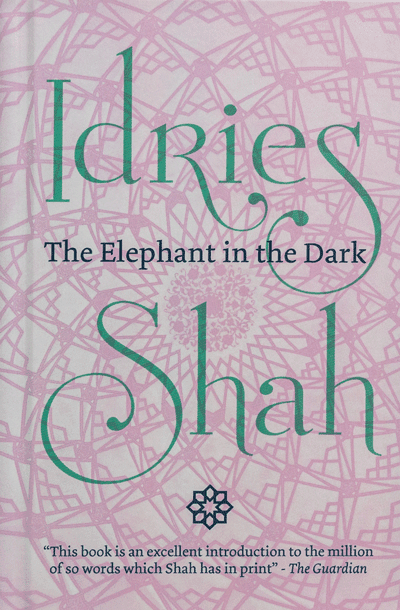Based on Idries Shah’s celebrated Geneva University lectures, this important cross-cultural book dazzles with the breadth of its scholarship, and the profound depth of its message.
Elephant in the Dark: Christianity, Islam and the Sufis explores the episodes of cooperation and understanding between Christians and Moslems over nearly 1,500 years.
The title, The Elephant in the Dark, is from the traditional Eastern fable of the blind men and an elephant, in which various people experience an elephant differently based on the part of the animal they touch, and according to their subjective interpretations.
With this ancient fable, first described by the Sufi Master Jalaluddin Rumi, Idries Shah presents the Sufi perspective that Christianity and Islam stem from one, inner origin. Both faiths, he tells us, share common ground in more ways than we know.
In a world riven by cultural and religious differences, The Elephant in the Dark offers fresh thinking, hope, and a deeper understanding that goes beyond superficial appearances.
‘This book is an excellent introduction to the million or so words which Shah has in print.’
The Guardian
‘Shah seems to suggest that the time is ripe for a true ecumenism... Christianity and Islam, each preserving its essential nature, might recognise the validity of a union, if not of doctrine, at least of spirit.’
The Evening News
I
1 The Information-Gap and Ecumenism
2 The Islamic attitude to Jesus
3 Understanding between Christians and Muslims
Role of Christians in the acceptance and protection of Muslims
4 Co-operation of the Negus: Benefits accorded to Muslims
5 Islamic protection of the Mount Sinai monks
6 The Arab Christians
7 The Monk Bahaira and Abu Talib
8 The Cave of Hira and the prediction of Waraqah
9 The Throne Verse and the Light Verse of the Qur’an
10 Islamic Tales of Jesus
II
11 Dialogue and Differences
12 Ghazzali and the Way of the Worshippers
The Seven Valleys of the Path:
i The Valley of Knowledge
ii The Valley of Repentance
iii The Valley of Stumbling Blocks
iv The Valley of Tribulations
v The Thundering Valley
vi The Abysmal Valley
vii The Valley of Hymns
13 Interaction and relationships:
Christians and Muslims: Rodrigo;
Rumi; Ramon Lull
14 Islam as Surrender, Salam as Salvation
15 The Western mystics and thinkers affected by Islam and the Sufis
16 Contemporary scholars, writers and others on the Islamic and Sufi contribution in the future
Bibliography
When the Mecca trading caravan of Abu Talib, uncle of Muhammad, was moving towards
its Syrian destination, it passed the Christian monastery of Jabal Harun, where a certain revered
Christian monk, Bahira, worshipped, performing his devotions and dedicating his life to God.
One day, breaking his ordinary custom, Bahira, to the perplexity of the caravaneers, invited them all to a feast at his monastery.
Bahira did not explain his reasons to them, but looked at them all, one by one, and then asked:
‘Is there any one of your number who did not accompany you tonight?’
‘Yes,’ they said, ‘there is one, a young lad of twelve years of age, whom we left in our tents below, too young to accompany us.’
Bahira insisted that he be brought and said to him: ‘Young man, I have a question to ask – will you answer it, by Lat and Uzza, your great gods of stone?’
The youth answered:
‘Do not address me in the name of idols, for I owe no allegiance to them: but ask me in the name of God, and by God I shall answer you.’
Bahira asked him many things, and finally turned to Abu Talib and said:
‘This is no ordinary man, this Muhammad, thy brother’s son. He shall be a prophet. Heed my words and watch over him with constant care, thy charge is precious to humanity.’
From The Elephant in the Dark by Idries Shah
Copyright © The Estate of Idries Shah
Idries Shah was born in India in 1924 into an aristocratic Afghan family. He was an author and teacher in the Sufi tradition and is considered one of the leading thinkers of the 20th century.
Shah devoted his life to collecting, translating and adapting key works of Sufi classical literature for the needs of the West. Called by some 'practical philosophy' - these works represent centuries of Sufi and Islamic thought aimed at developing human potential. His best-known works include the seminal book The Sufis, several collections of teaching stories featuring the ‘wise fool’ Nasrudin, Reflections and Knowing How to Know.
Shah's corpus - over three dozen books on topics ranging from psychology and spirituality to travelogues and cultural studies - have been translated into two dozen languages and have sold millions of copies around the world. They are regarded as an important bridge between the cultures of East and West.
UK Paperback
ISBN: 978-1-78479-102-5
Language: English
US Paperback
ISBN: 978-1-78479-105-6
Language: English
UK Hardcover
ISBN: 978-1-78479-942-7
Language: English
US Hardcover
ISBN: 978-1-78479-940-3
Language: English
UK eBook
ISBN: 978-1-78479-104-9
Language: English
US eBook
ISBN: 978-1-78479-107-0
Language: English
UK Kindle
ISBN: 978-1-78479-103-2
Language: English
US Kindle
ISBN: 978-1-78479-106-3
Language: English
UK Large Print
ISBN: 978-1-78479-856-7
Language: English
US Large Print
ISBN: 978-1-78479-857-4
Language: English
UK Pocket
ISBN: 978-1-78479-943-4
Language: English
US Pocket
ISBN: 978-1-78479-941-0
Language: English
